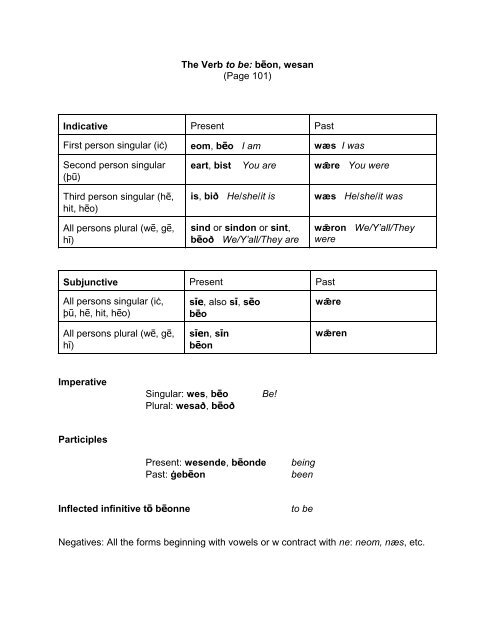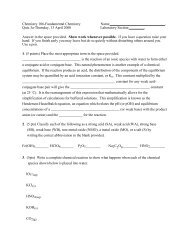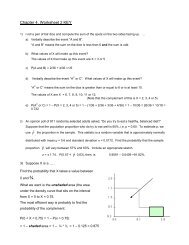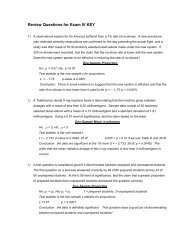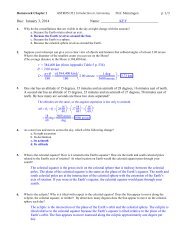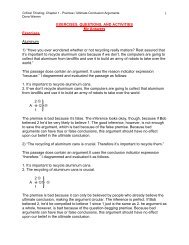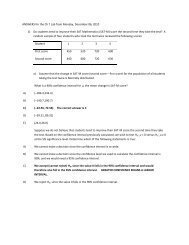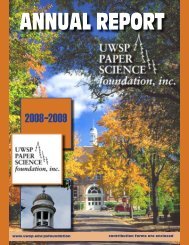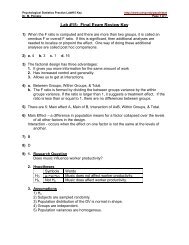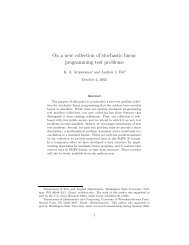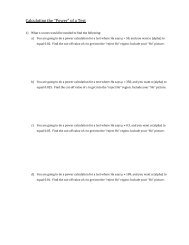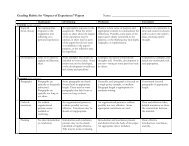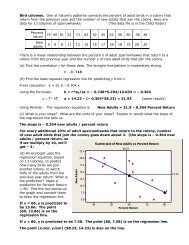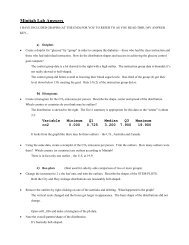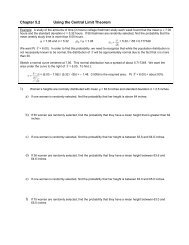You also want an ePaper? Increase the reach of your titles
YUMPU automatically turns print PDFs into web optimized ePapers that Google loves.
The <strong>Verb</strong> to be: bēon, wesan(Page 101)Indicative Present PastFirst person singular (iċ) eom, bēo I am wæs I wasSecond person singular(þū)eart, bist You are wǣre You wereThird person singular (hē,hit, hēo)All persons plural (wē, gē,hī)is, bið He/she/it issind or sindon or sint,bēoð We/Y’all/They arewæs He/she/it waswǣron We/Y’all/TheywereSubjunctive Present PastAll persons singular (iċ,þū, hē, hit, hēo)All persons plural (wē, gē,hī)sīe, also sī, sēobēosīen, sīnbēonwǣrewǣrenImperativeSingular: wes, bēoPlural: wesað, bēoðBe!ParticiplesPresent: wesende, bēondePast: ġebēonbeingbeenInflected infinitive tō bēonneto beNegatives: All the forms beginning with vowels or w contract with ne: neom, næs, etc.
Forming negativesThe particle ne, meaning not, normally goes in front of the verb.When the verb begins with a vowel, we get elision (i.e., we contract the negativeparticle and the verb into one word, dropping the e from ne).I am not: Iċ ne+eom = Iċ neom.He is not: Hē ne+is = Hē nis.When the verb begins with a w, we get elision by dropping both the e from ne and thew from the verb.I was not: Iċ ne+wǣs = Iċ nǣs.
The <strong>Irregular</strong> <strong>Verb</strong> willan(Page 103-4)Willan becomes the modern will, and is starting to have some of the auxiliary verb useof the modern verb, but it primarily means to wish or to will in the sense of to want.Willan routinely contracts in the negative to form nillan, often spelled nyllan or nellan.Indicative Present PastFirst person singular (iċ) wil(l)e I wish/want/intend wolde I wantedSecond person singular(þū)wilt You wantwoldest You wantedThird person singular (hē,hit, hēo)All persons plural (wē, gē,hī)wil(l)e He/she/it wants wolde He/she/it wantedwillað We/y’all/they want woldon We/y’all/theywantedSubjunctive Present PastAll persons singular (iċ,þū, hē, hit, hēo)All persons plural (wē, gē,hī)wil(l)ewillenwoldewoldenImperative:Rarely used for this verb, only in the negative plural: nyllað,nellað: don’t wish toParticiplesPresent: willende wantingInflected infinitive tō willenne to want
The <strong>Irregular</strong> <strong>Verb</strong> dōn(Page 102-3)Dōn becomes the modern do, and is similar to the modern verb in its meanings, but ithas the additional meaning of to cause.Indicative Present PastFirst person singular (iċ) dō I do/cause dyde I did/causedSecond person singular(þū)Third person singular (hē,hit, hēo)All persons plural (wē, gē,hī)dēst You do/causedēð He/she/it doesdōð We/y’all/they dodydest You did/causeddyde He/she/it diddydon We/y’all/they didSubjunctive Present PastAll persons singular (iċ,þū, hē, hit, hēo)All persons plural (wē, gē,hī)dōdōndydedydenImperativeSingular: dōPlural: dōðDo!ParticiplesPresent: dōnde doingPast: ġedōn or dōn doneInflected infinitivetō dōnne to do
The <strong>Irregular</strong> <strong>Verb</strong> gān, to go(Page 102-3)Indicative Present PastFirst person singular (iċ) gā I go ēode I wentSecond person singular(þū)Third person singular (hē,hit, hēo)All persons plural (wē, gē,hīe)gǣst You gogǣð He/she/it goesgāð We/y’all/they goēodest You wentēode He/she/it wentēodon We/y’all/they wentSubjunctive Present PastAll persons singular (iċ,þū, hē, hit, hēo)All persons plural (wē, gē,hīe)gāgānēodeēodenImperativeSingular: gāPlural: gāðGo!ParticiplesPresent: gāndePast: ġegān or gāngoinggoneInflected infinitivetō gānne to go


